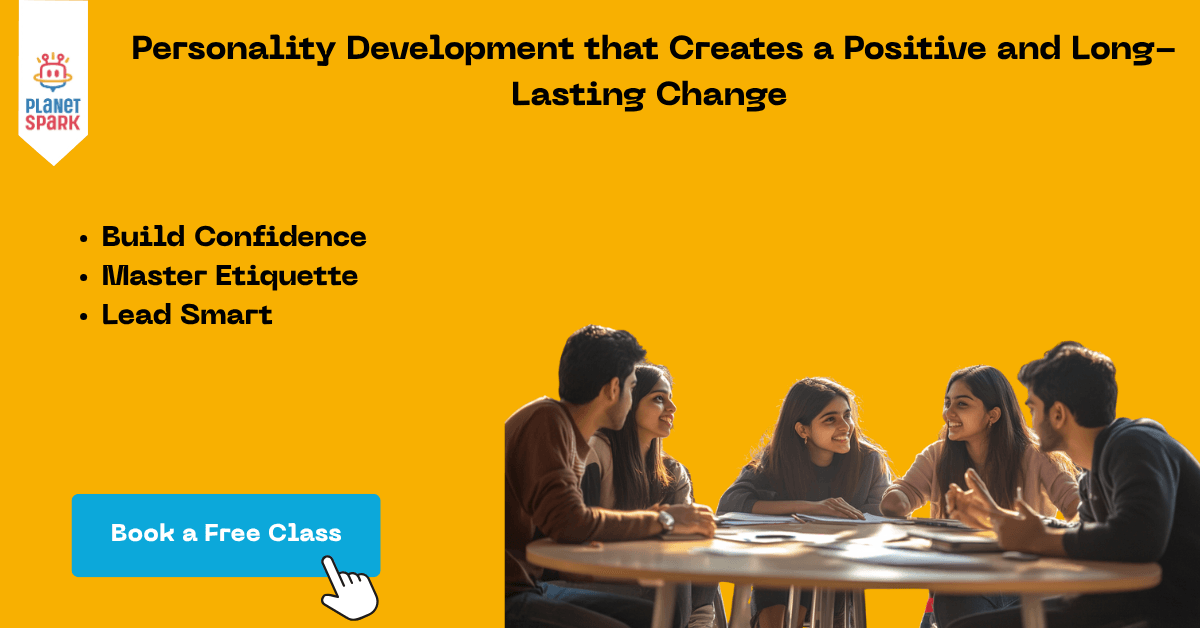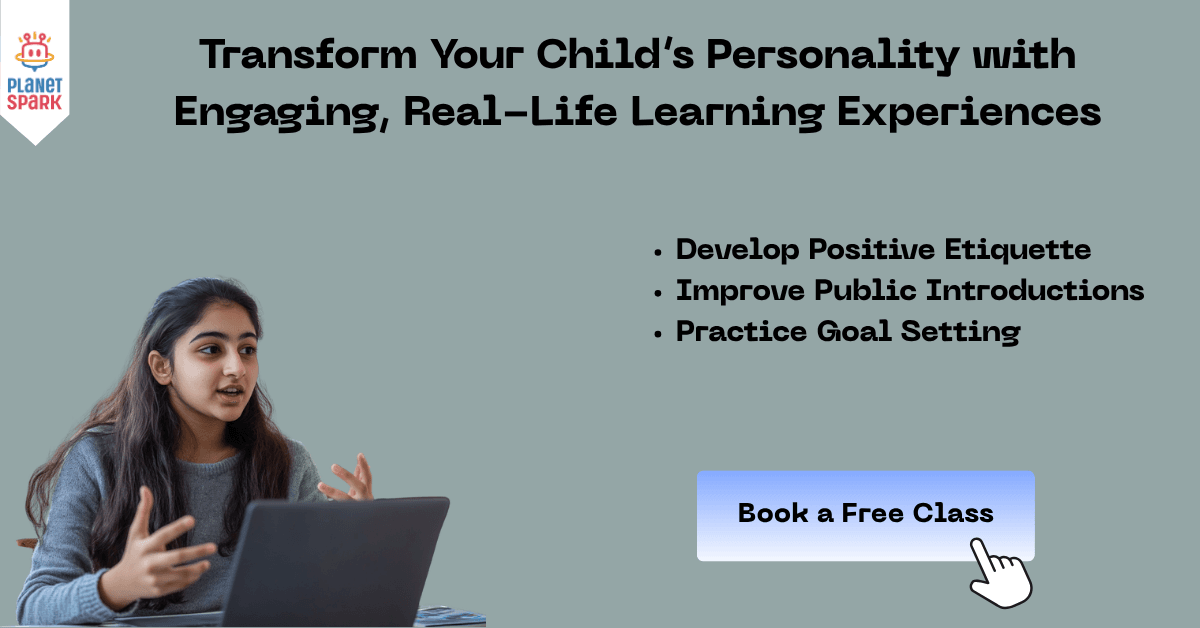Impact of Social Media on Youth Self-Esteem

Table of Contents
- The Double-Edged Sword of Social Media
- Positive Impact of Social Media on Youth Self-Esteem
- Negative Impact of Social Media on Youth Self-Esteem
- The Role of Peer Validation
- Identity Formation and Social Media
- Social Media Addiction and Self-Esteem
- FOMO: Fear of Missing Out
- The Role of Influencers in Youth Identity
- Digital Validation: The New Self-Worth
- Cyberbullying and Its Emotional Impact
- Social Media and Body Image
- Online vs. Offline Confidence
- Strategies for Parents and Educators
- Building Resilience and Authenticity
- Offline Skills That Strengthen Self-Esteem
- Why Choose PlanetSpark?
The digital world has transformed the way young people connect, learn, and express themselves. For Generation Z, social media is not just a platform; it’s a lifestyle. While these platforms provide opportunities for self-expression, networking, and creativity, they also carry significant consequences. One of the most pressing concerns today is the impact of social media on youth self-esteem, confidence, and mental well-being. Parents, educators, and even the youth themselves are increasingly aware that likes, shares, and comments have become modern-day measures of self-worth.
In this blog, we will explore how social media shapes the self-image of young people, both positively and negatively. From building connections and identity to fostering comparison and pressure, every aspect of digital life influences personality growth. We will also cover practical strategies for helping youth develop resilience, emotional intelligence, and confidence to manage these challenges. By the end, you’ll not only understand the influence of social platforms but also discover how personality development training can empower children to thrive in both online and offline worlds.
Here’s what this blog will cover:
The role of social media in shaping youth identity and self-esteem
Positive ways social media contributes to confidence and communication
Negative impacts like comparison, cyberbullying, and addiction
Personality development strategies to balance online and offline growth
Why PlanetSpark is the right choice for teaching children resilience, confidence, and communication skills

The Double-Edged Sword of Social Media
Social media platforms have given youth unprecedented visibility. Teenagers and young adults can now express their opinions, share creative work, and even build careers as influencers. For many, this visibility boosts confidence and encourages self-expression. It allows introverted students to voice themselves online when they may struggle in face-to-face interactions.
However, this very visibility comes with risks. Constant exposure to curated lifestyles, idealized beauty standards, and follower counts can create insecurity. Young people often begin comparing themselves to peers and influencers, leading to self-doubt. The impact of social media on youth is profound because identity formation during adolescence is fragile, and external validation easily shapes self-esteem.
Positive Impact of Social Media on Youth Self-Esteem
Despite criticism, social media isn’t all harmful. It can enhance self-esteem when used wisely. Many young people use platforms to showcase their talents, be it art, writing, dance, or public speaking. Recognition from peers and global communities can motivate them to pursue passions.
Moreover, social platforms encourage communication skills. A teenager posting a blog, running a YouTube channel, or creating reels is practicing storytelling, public speaking, and content creation. These are valuable 21st-century skills that build confidence. For socially anxious youth, online communities offer a sense of belonging and identity validation.
Negative Impact of Social Media on Youth Self-Esteem
While there are positives, the darker side of social media often overshadows the benefits. Constant comparison to influencers who project “perfect” lives can make ordinary teenagers feel inadequate. This phenomenon is known as social comparison theory, where self-worth is tied to perceived superiority or inferiority to others.
Another negative factor is cyberbullying. Harsh comments, trolling, or online exclusion directly damage confidence. Research shows that teenagers experiencing online harassment are more likely to suffer from anxiety, depression, and poor self-image. In extreme cases, the impact of social media on youth can extend to severe emotional breakdowns and withdrawal from social life.
Enroll them in PlanetSpark’s Personality Development Program, where they’ll learn resilience, emotional intelligence, and self-confidence.
The Role of Peer Validation
Adolescence is already a stage where peer approval plays a big role in self-esteem. Social media multiplies this pressure. Every post becomes a public display of how many likes, comments, and shares one can attract. A single negative remark can overshadow 50 positive ones, leading to emotional distress.
The impact of social media on youth self-esteem here is critical because young minds tie validation to metrics rather than personal value. While some develop coping mechanisms, many internalize rejection and compare their popularity with others. This cycle makes youth more vulnerable to anxiety and overthinking.
Identity Formation and Social Media
Teenagers often use social media as a testing ground for identity. They try out different styles, interests, and voices to see how peers respond. This experimentation can be healthy, helping them explore their personality. It allows them to connect with communities that reflect their interests and values, which can strengthen identity.
However, when self-worth becomes tied to online reactions, youth risk developing fragile self-esteem. A young person who constantly rebrands themselves for acceptance may struggle to establish a stable sense of self offline. This shows that while identity formation online is flexible, it can also be unstable.
PlanetSpark’s Personality Development Classes teach them to build confidence that shines both online and offline.
Social Media Addiction and Self-Esteem
One of the biggest issues facing Generation Z is the constant urge to check social media. Notifications, streaks, and endless scrolling are designed to keep young people hooked. Over time, this turns into an addiction that directly impacts their productivity, relationships, and mental well-being.
From a self-esteem perspective, addiction reduces real-world confidence. Instead of developing hobbies or social skills offline, youth often rely on digital validation. The impact of social media on youth here is subtle but powerful when likes and views become the only source of happiness, and self-esteem weakens outside the digital world.
Join PlanetSpark’s Personality Development Program to help them break free from screen addiction and build real-life confidence.
Book your free trial today, only a few slots left this week!
FOMO: Fear of Missing Out
Another major challenge for young people is FOMO, the fear of missing out. Seeing peers post about vacations, parties, or achievements can make teenagers feel left out or inferior. Even if they are happy in real life, the constant comparison online creates dissatisfaction.
FOMO has a direct effect on youth self-esteem because it fosters insecurity. Instead of enjoying the present, many teens feel anxious about not measuring up to their peers. This leads to over-participation in trends, unhealthy competition, and, in some cases, withdrawal due to feelings of inadequacy.
The Role of Influencers in Youth Identity
Influencers have become modern celebrities, and young people look up to them for lifestyle cues, fashion inspiration, and even career goals. While many influencers inspire positivity, discipline, or creativity, others promote unrealistic standards. Youth often compare their appearance, achievements, or popularity with these influencers, forgetting that much of it is curated and filtered.
The impact of social media on youth through influencers is particularly strong because adolescence is a phase of identity formation. When teens imitate influencers blindly, they risk losing authenticity. On the other hand, following positive role models can encourage goal-setting and self-improvement. The challenge is guiding youth to differentiate between real inspiration and harmful comparison.

Digital Validation: The New Self-Worth
For many young people, validation no longer comes from achievements in school, sports, or personal growth. Instead, it comes from likes, comments, and shares. A post that performs well boosts confidence, while low engagement often leads to self-doubt. This fragile form of self-worth makes youth highly dependent on external approval.
Psychologists warn that this creates a cycle of dependency. The impact of social media on youth here is the shift from intrinsic self-worth (valuing oneself for personal strengths) to extrinsic validation (valuing oneself for social media response). Over time, this weakens resilience and creates emotional instability.
Cyberbullying and Its Emotional Impact
Cyberbullying is one of the most harmful effects of social media. Unlike traditional bullying, online harassment follows young people everywhere; there is no escape. Negative comments, trolling, or exclusion from online groups can deeply affect self-esteem.
The problem worsens because many teens internalize online negativity. Instead of viewing bullying as a reflection of the bully’s behavior, they often blame themselves. This is why cyberbullying is strongly linked to depression, anxiety, and even suicidal tendencies in extreme cases. The impact of social media on youth in this context is devastating when support systems are weak.
Social Media and Body Image
Platforms like Instagram and TikTok amplify beauty standards through filters, editing tools, and influencer culture. For teenagers still forming their self-image, these curated versions of beauty can create body dissatisfaction.
Young people often feel pressure to look a certain way to gain likes or attention. This can lead to unhealthy dieting, over-exercising, or even complete avoidance of social interactions due to insecurity. The impact of social media on youth self-esteem here is one of the most alarming because it connects appearance with self-worth.
Online vs. Offline Confidence
A growing concern is the gap between online confidence and offline personality. Many teenagers who appear confident online struggle with real-world communication. They may be able to post confidently but hesitate in classrooms, presentations, or face-to-face conversations.
This “confidence paradox” highlights how the impact of social media on youth creates a digital mask. To build sustainable self-esteem, it’s essential to balance online expression with offline personality development. Only then can young people translate their digital presence into real-world success.
Transform your child’s online confidence into offline charisma! Sign up for PlanetSpark’s Personality Development Classes today.
Strategies for Parents and Educators
While the challenges of social media are undeniable, the solution is not to ban or completely restrict platforms. Instead, parents and educators should guide young people to use social media mindfully. Encouraging balanced routines where online time is matched with offline hobbies, reading, sports, or creative activities helps children build confidence beyond screens.
It’s also essential to talk openly about the impact of social media on youth. Conversations around filters, comparison, and curated content allow teenagers to differentiate between real and fake representations online. Parents who model healthy digital habits set an example for their children to follow.
Building Resilience and Authenticity
Resilience is the ability to bounce back from negativity, criticism, or failure. For young people, resilience is the key to dealing with online hate, low engagement, or cyberbullying. Teaching children that self-worth comes from skills, values, and achievements, not followers, creates unshakable self-esteem.
Authenticity is equally important. Instead of copying influencers, youth should be encouraged to embrace their uniqueness. Authentic expression not only reduces pressure but also builds long-term confidence. The impact of social media on youth becomes positive when children learn to use it as a tool for creativity rather than comparison.
Help your child build resilience and authenticity with PlanetSpark’s Personality Development Classes.
Book your free trial today. Only a handful of slots remain for this month!
Offline Skills That Strengthen Self-Esteem
While online platforms offer expression, offline life builds personality. Public speaking, creative writing, sports, and group activities all contribute to confidence. Children who are skilled in face-to-face communication feel less dependent on digital validation.
By integrating both online and offline growth, we ensure that the impact of social media on youth becomes balanced. Offline achievements reinforce intrinsic self-worth, while online activities remain just one aspect of expression.
The impact of social media on youth is a complex mix of opportunities and risks. While platforms can empower creativity and global connection, they can also weaken self-esteem through comparison, addiction, and digital validation. The solution lies in balance, guiding youth to use social media wisely while strengthening offline skills and personality.
With structured training, mentorship, and creativity-driven programs like PlanetSpark, children can develop resilience, confidence, and authenticity that go beyond likes and followers. The future belongs to those who can express themselves with clarity and confidence, both online and offline, and PlanetSpark ensures your child is ready for that future.
Why Choose PlanetSpark?
At PlanetSpark, our core goal is to develop self-confidence, leadership, emotional intelligence, and social etiquette in every child. We believe true personality development goes far beyond academics, empowering children to shine in every social, academic, and professional setting.
Here’s what makes our Personality Development Program unique:
Holistic Curriculum Beyond Academics
We cover the most essential life skills, communication etiquette, self-introduction, goal setting, peer interaction, leadership, self-awareness, and critical thinking, helping children grow into well-rounded individuals.Social-Emotional Learning (SEL) Based Design
Our curriculum is aligned with CASEL standards (Collaborative for Academic, Social, and Emotional Learning), ensuring a balanced approach to personal and interpersonal development.Practical, Activity-Based Learning
From mock interviews and public introductions to journaling, feedback sharing, and real-life simulations, our classes are highly interactive and focused on learning by doing.Leadership & Self-Presentation Training
We nurture empathy, responsibility, assertiveness, and teamwork through fun leadership challenges that build children into confident leaders of tomorrow.Confidence Meter & Parent Consultations
We track growth across confidence, openness, and leadership orientation while keeping parents updated through regular consultations on their child’s progress.Etiquette and Body Language Sessions
Children learn the art of making lasting impressions—eye contact, posture, tone modulation, and respectful communication are part of their everyday grooming.
With PlanetSpark, your child doesn’t just learn; they transform into confident, emotionally intelligent, and socially responsible individuals who can thrive in every environment.
Give your child the PlanetSpark edge today.
Frequently Asked Questions
Social media can boost confidence through creativity and expression, but it often reduces self-esteem by encouraging comparison, addiction, and reliance on digital validation.
Not necessarily. The impact of social media on youth can be positive when platforms are used for learning, sharing talents, and connecting with supportive communities. The problem arises with overuse and unhealthy comparison.
Influencers act as role models for youth. Positive influencers can inspire creativity and discipline, while unrealistic portrayals may lead to insecurity and fragile self-worth.
Parents should encourage open discussions about online content and remind children that most posts are curated. Balancing digital time with offline hobbies also reduces FOMO.
Encouraging offline achievements, teaching emotional intelligence, and providing safe spaces for expression help children build resilience and strong self-esteem.
Personalized Communication Report
Record a video to get a AI generated personalized communication report for your child

Hi There, want to try these
tips for your child with
LIVE with our expert coach?
Let's check your child's
English fluency
